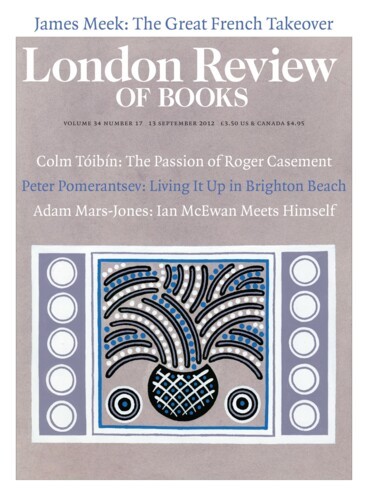The Russian Orthodox Church is on holy war footing. The ‘sacrilege’ of Pussy Riot is no isolated incident, Patriarch Kirill says, but part of a wave of attacks on the church, ranging from accusations of financial irregularity to seemingly random acts of vandalism against church property. The attack on the church is not just anti-religious, according to pro-Kremlin media, but part of a larger geopolitical campaign by America to destabilise Russia.
Peter Pomerantsev
Peter Pomerantsev’s latest book, This Is Not Propaganda, won the 2020 Gordon Burn Prize.
Diary: In Brighton Beach
Peter Pomerantsev, 13 September 2012
When Eddie Petrovsky, a Russian immigrant, opened his restaurant Cosmos in the traditionally Italian area of Bay Ridge in Brooklyn, the locals all assumed he was a gangster. ‘They think any Russian who drives a Lexus has to be mafia. The whole gangster thing was way back, in the 1990s, but they can’t believe Russian immigrants could make it by just working hard.’ Eddie, it has to be said, looks like a friendlier version of Tony Soprano – but his main source of income is a valet parking business serving Hasidic weddings. He arrived in the US from Siberia in 1990, a 22-year-old straight out of university, part of the post-Soviet influx.
Moscow isn’t short of places to waste your nights in. The city comes into its own after dark. As in Spain, despite the difference in latitude, you eat late and drink until even later. At the height of the oil boom, Saturday night could be spent spinning through a glittering whirligig of clubs where Chechen gangsters snorted coke with cross-dressing performance artists, Kremlin spin doctors hung with theatre directors, grinning thirtysomething billionaires seemed intent on spending oil wells of money at the bar, and the cloakroom girls looked like supermodels. The mood was part LL Cool J video, part Studio 54, part Petronius’ Rome.
‘It’s taken twenty years but suddenly I’m a hero,’ says Martin Šimečka, one of the Slovak dissident writers of the 1980s. ‘After the liberation no one wanted to talk openly about the Communist period. Dissidents weren’t heroes but reminders of people’s own conformism – but now there’s a young generation who want to stand up to the state, and they turn to me as a role model.’ I was in Bratislava for the Central European Forum: an event held annually around 17 November, the anniversary of the 1989 Velvet Revolution. The Forum brought together the old generation of Eastern European dissidents with participants and observers of new protest movements: a member of the Spanish indignados talked about utopia in a euphoric rush; there were Hungarian anti-Orbán activists, Occupy, Pussy Riot and Ai Weiwei specialists. ‘The new generation here are hopeless – they wanted to protest austerity measures in Slovakia but couldn’t achieve anything,’ according to Zuzana Szatmáry, a Slovak poet and essayist who worked in a factory for 20 years. ‘I enjoyed the factory, I learnt how to get tangible results. If you want change then you have to adapt protest to the specific state you’re battling.’
‘This is like the Cold War,' a Russian foreign ministry spokesman said in December after President Obama signed the Sergei Magnitsky Rule of Law Accountability Act. 'We will retaliate.' The act allows for the public naming of Russian officials involved in 'extrajudicial killings, torture or other gross violations of internationally recognised human rights'. It also allows for their US assets to be suspended and for them to be barred entry into the States. Sergei Magnitsky was a Russian corporate lawyer who was tortured and died in Butyrka Prison in Moscow in 2009 after accusing various Russian bureaucrats of perpetrating a $230 million tax fraud. The law named after him is targeted at the many corrupt Russian officials who act with impunity at home and then spend their ill-gotten gains in the West. But of course the US isn’t the favoured destination of rich Russians. Most prefer to keep their property, wives, mistresses, football teams, newspapers and children in the UK. What would really hurt corrupt Russian officials is a Magnitsky Act here. But will it happen?
Podcasts & Videos
Peter Pomerantsev, Marina Hyde and Carl Miller: This is Not Propaganda
Peter Pomerantsev
Peter Pomerantsev’s latest book, This is Not Propaganda, travels the world to investigate why we can no longer believe what we say, or say what we believe. He talks about here with Marina Hyde and Carl...
Diary: European Schools
Peter Pomerantsev
Peter Pomerantsev reads his diary about his time in the 'English section' at the European School in Munich.
Diary: Iammmmyookkraaanian
Peter Pomerantsev
Peter Pomerantsev reads his piece on the images and myths of Maidan.
Read anywhere with the London Review of Books app, available now from the App Store for Apple devices, Google Play for Android devices and Amazon for your Kindle Fire.
Sign up to our newsletter
For highlights from the latest issue, our archive and the blog, as well as news, events and exclusive promotions.


